Nippon: The Inscrutable Orient
Nippon: The Inscrutable Orient - Hallo Guyst Review Games Update, In the article you read this time with the title Nippon: The Inscrutable Orient, we have prepared this article well for you to read and take information in it. hopefully the post content
Artikel Nippon, what we write can you understand. alright, happy reading.
Title : Nippon: The Inscrutable Orient
link : Nippon: The Inscrutable Orient
Well, I bumbled around Nippon for another four hours, and I can't say that I'm any closer to understanding the story or main quest. In a modern game, that wouldn't be such a problem because the dungeons would be atmospheric and the character development robust and the gameplay enjoyable, but--as I keep stressing--1980s RPG development just wasn't there yet. It was too soon for games with the scope of Deathlord, Fate, Nippon, and many of the others with epic ambitions--particularly when they don't offer mechanics as complex as the best RPGs of the period. I would have cautioned a developer of the time to at least make sure they could replicate Ultima V's combat system, inventory complexity, and depth of NPC interaction before setting out to make a game four times its size.
The Nippon Museum offers a map that came with the game, but it's too stylized for my tastes and gets the geography of the smaller landmasses and islands all wrong. I've been unapologetically using another one from the site that is more geographically accurate, but still manages to avoid spoilers such as the locations of towns. Normally, I'd consider that cheating, but I'll allow it to offset my language disadvantage. Anyway, extrapolating from a measurement I took on the starting island, I suspect the game world is close to 720 x 400.
The towns vary in size but the largest so far have been around 70 x 70, which would be really hard to navigate except that each one has a map hidden somewhere. When I arrive in a new town, my first priority is to find the map and use it to plot a basic navigation path.
As I wrapped up last time, I was entering a large city on the coast called Watashibune. NPCs throughout the town talked about boats and sailing, and pretty soon I discovered both boat sales and boat repair locations. Boats sold for 1,500 gold pieces--out of my reach but not outrageously so. I could have gone outside and grinded for it. Instead, I let my finances grow naturally as I explored other parts of the starting continent.
A little town on an oasis called Tokoro-Chian offered more lore and potential quest advice than any town so far. I had previously found a door in the mountains that took me to an indoor area with a huge lake of fire. In Tokoro-Chian, I learned that to survive the fire, I need the Amulet of Hi, which I can find in some place called Fujokawa. An NPC named Yosutebito told me that I'll need to find the Wheel of Time in the north to return to my own world. Shoka-no suggested what may be a side quest: the "sun horse" of the goddess Amaterasu has been stolen by the god of war, Hachiman, who lives in the castle of Atatakami in the south. I learned from Ta-is Tagre that I'll need some flying mechanism to reach locations in the mountains, including some important inscription.
I returned to Akuji, the starting town, and trained to 100% with the shuriken. By this time, I had fought enough combats to have enough for the boat and then some, so I made my way back to Watashibune.
Money is a key component to any RPG, but it really makes the world go round here. So far, I haven't found anything like a dungeon full of treasure chests. One city had some gold that I could pick up. (The manual gives you a funny justification for this: "The gold lying in the chambers is mostly illegally acquired and can be used for your purposes.") Otherwise, all income comes from combat. Perhaps in recognition of this, combat is reasonably rewarding, offering around an average of 30 gold pieces for each enemy killed in outdoor combat.
There are lots of things to spend money on, including many weapons and armor items that are well out of my reach. A lot of towns have healers that not only cure wounds but also grant you temporary strength or rejuvenate you (more on this in a bit); others cure conditions like blindness, curses, and paralysis, none of which I've yet experienced. Shops sell keys (every city has locked doors), incense, and sacks that increase your carrying capacity. You always have to replenish food. Weapons and armor can get damaged and require repair. You need training on weapons, and you can pay (theoretically) to increase your attributes. You can even pay for things that I think serve only role-playing purposes, such as nights at the inn with optional prostitutes, baths, and massages.
I don't care for the game's dialogue "stance" system and I've mostly been subverting it. I don't know how to fix things if you choose the wrong approach. Almost all NPCs respond to "normal" or "friendly" approaches, but every once in a while, one of them wants you to be "religious" or "submissive" or even "superior." If you choose the wrong thing, they clam up. So I take a save before talking with them and reload if they respond negatively. The game is hard enough.
I also wouldn't mind if I didn't have to stop and feed my character so often. If the developers were going to make him so hungry, the least they could have done was have him eat automatically. Sometimes I miss the "you are hungry" message--it doesn't re-appear after the first warning--and my character will suddenly die because I haven't been noticing his health bar go down.
After I bought the boat, I sailed up north even though I hadn't finished exploring the main continent. I explored two more towns and decided to get back to Ultima Underworld. Here are a bunch of items from my explorations:
Entering the combat screen from the boat causes you to use the boat's cannons as the primary weapon. They're pretty devastating, but anything that can attack you at sea is equally tough and can damage both you and the boat. You can blast helpless enemies on shore, too, but you get only experience, not gold, from winning boat combats.
Touching any land while sailing the boat causes it to become damaged. It's hard to avoid this in narrow rivers.
One thing that I still haven't experienced is any sense of character development. I think maybe I'm supposed to burn incense at Buddha statues to "level up," but each city that has such a statue also has a puzzle associated with getting to it, and I've come up short. In Ukosa, the statue was at the end of a maze of pillars with invisible walls between some of them, and I could't find a way through. An NPC said something about walking through the "central pillar," but none of the pillars that seemed to be "central" (no matter how I looked at it) would allow me to do any such thing.
Meanwhile, in Ubamachi, a northern city ruled by Shujin, the Buddha is in the mountains. Supposedly, there's a secret path to get there, and an NPC directed me to a statue to ask about it. The statue told me to give it a "yari." I had no idea what this was, but I later found a weapon shop in a different town selling them for 3,450 gold. That'll have to wait.
Thus, well past the six-hour mark, I'm still a bit clueless. My only consolation is that it sounds like German players of the time were, too. I'll give it another 3 or 4 hours, at least, before deciding whether to continue. I'd lean towards a premature ending, but the next game, Ranadinn, is also an Ultima-inspired title with epic ambitions. Please moongate me out of this era.
You are now reading the articlel Nippon: The Inscrutable Orient with link address https://reviewgameupdate.blogspot.com/2018/03/nippon-inscrutable-orient.html
Title : Nippon: The Inscrutable Orient
link : Nippon: The Inscrutable Orient
Nippon: The Inscrutable Orient
Well, I bumbled around Nippon for another four hours, and I can't say that I'm any closer to understanding the story or main quest. In a modern game, that wouldn't be such a problem because the dungeons would be atmospheric and the character development robust and the gameplay enjoyable, but--as I keep stressing--1980s RPG development just wasn't there yet. It was too soon for games with the scope of Deathlord, Fate, Nippon, and many of the others with epic ambitions--particularly when they don't offer mechanics as complex as the best RPGs of the period. I would have cautioned a developer of the time to at least make sure they could replicate Ultima V's combat system, inventory complexity, and depth of NPC interaction before setting out to make a game four times its size.
The Nippon Museum offers a map that came with the game, but it's too stylized for my tastes and gets the geography of the smaller landmasses and islands all wrong. I've been unapologetically using another one from the site that is more geographically accurate, but still manages to avoid spoilers such as the locations of towns. Normally, I'd consider that cheating, but I'll allow it to offset my language disadvantage. Anyway, extrapolating from a measurement I took on the starting island, I suspect the game world is close to 720 x 400.
 |
| What I love about this map is how it's so clearly Japan. |
The towns vary in size but the largest so far have been around 70 x 70, which would be really hard to navigate except that each one has a map hidden somewhere. When I arrive in a new town, my first priority is to find the map and use it to plot a basic navigation path.
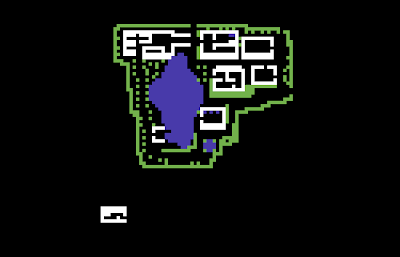 |
| Without this map, I never would have known about a "hermit" living in the southwest. |
As I wrapped up last time, I was entering a large city on the coast called Watashibune. NPCs throughout the town talked about boats and sailing, and pretty soon I discovered both boat sales and boat repair locations. Boats sold for 1,500 gold pieces--out of my reach but not outrageously so. I could have gone outside and grinded for it. Instead, I let my finances grow naturally as I explored other parts of the starting continent.
A little town on an oasis called Tokoro-Chian offered more lore and potential quest advice than any town so far. I had previously found a door in the mountains that took me to an indoor area with a huge lake of fire. In Tokoro-Chian, I learned that to survive the fire, I need the Amulet of Hi, which I can find in some place called Fujokawa. An NPC named Yosutebito told me that I'll need to find the Wheel of Time in the north to return to my own world. Shoka-no suggested what may be a side quest: the "sun horse" of the goddess Amaterasu has been stolen by the god of war, Hachiman, who lives in the castle of Atatakami in the south. I learned from Ta-is Tagre that I'll need some flying mechanism to reach locations in the mountains, including some important inscription.
 |
| A key piece of intelligence. |
I returned to Akuji, the starting town, and trained to 100% with the shuriken. By this time, I had fought enough combats to have enough for the boat and then some, so I made my way back to Watashibune.
Money is a key component to any RPG, but it really makes the world go round here. So far, I haven't found anything like a dungeon full of treasure chests. One city had some gold that I could pick up. (The manual gives you a funny justification for this: "The gold lying in the chambers is mostly illegally acquired and can be used for your purposes.") Otherwise, all income comes from combat. Perhaps in recognition of this, combat is reasonably rewarding, offering around an average of 30 gold pieces for each enemy killed in outdoor combat.
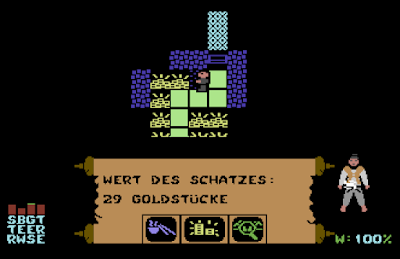 |
| Finding a rare "treasure room." |
There are lots of things to spend money on, including many weapons and armor items that are well out of my reach. A lot of towns have healers that not only cure wounds but also grant you temporary strength or rejuvenate you (more on this in a bit); others cure conditions like blindness, curses, and paralysis, none of which I've yet experienced. Shops sell keys (every city has locked doors), incense, and sacks that increase your carrying capacity. You always have to replenish food. Weapons and armor can get damaged and require repair. You need training on weapons, and you can pay (theoretically) to increase your attributes. You can even pay for things that I think serve only role-playing purposes, such as nights at the inn with optional prostitutes, baths, and massages.
 |
| Soon. |
I don't care for the game's dialogue "stance" system and I've mostly been subverting it. I don't know how to fix things if you choose the wrong approach. Almost all NPCs respond to "normal" or "friendly" approaches, but every once in a while, one of them wants you to be "religious" or "submissive" or even "superior." If you choose the wrong thing, they clam up. So I take a save before talking with them and reload if they respond negatively. The game is hard enough.
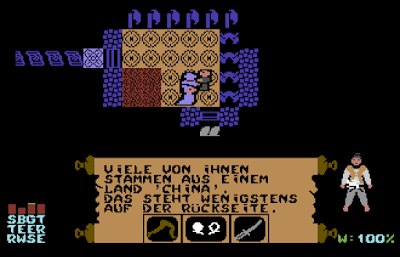 |
| This NPC mentions some of her artifacts as coming from China. |
I also wouldn't mind if I didn't have to stop and feed my character so often. If the developers were going to make him so hungry, the least they could have done was have him eat automatically. Sometimes I miss the "you are hungry" message--it doesn't re-appear after the first warning--and my character will suddenly die because I haven't been noticing his health bar go down.
 |
| No matter how much progress you're actually making, it always feels like you're getting somewhere when you buy a boat. |
After I bought the boat, I sailed up north even though I hadn't finished exploring the main continent. I explored two more towns and decided to get back to Ultima Underworld. Here are a bunch of items from my explorations:
- I bought a "gate icon" in one of the towns, which I guess allows me to use the teleporter system. I really haven't started exploring that yet. Some of the towns have teleporters that seem to go to central hubs or something.
- The countryside is swarming with NPCs like priests and farmers as well as enemies. They don't typically attack you, but if they happen to be on the screen when you initiate combat with a monster, they'll join the battle against you. I don't know if there are any karmic implications from killing them.
- Even though the game has a day/night cycle, with the screen going dark at night, shops remain open 24 hours and the NPCs stay where they are.
- You can't take the day/night cycle too literally, though. Years pass as you wander around, and even more as you pay for training. My character started at 20, I think, and I suddenly noticed he was 50! I had to pay for "rejuvenation" to stop him from dying of old age. It's nice that feudal Japan had that option. I wish that the modern world had it.
- When I stopped at an inn for the night, I decided to try the "bed and a woman" option. The German word was weib, which Google Translate tells me can also mean "wife," so I might have made a big mistake. There was no special message, but I got 250 experience points! That means that there's a way to convert gold directly to experience in the unlikely event that you ever run out of things to buy.
- Oddly, after waking up from the above encounter, I found an NPC in my room. He said his name was "Schoco la de," said he was a "murderer," and insisted that I was in his room.
- There are a lot of jokes and puns in the NPC names. So far, for instance I've encountered Cha-in-ma-il, Skusi-san, Chingis-kan, Qwerty, and Razmataz. I'm sure there are dozens of others going over my head because they mean something in German. For instance, "Ta-tagre-is," which is clearly Tattergreis, or "doddering old man."
- Purchasing a clock gave me a new menu option that tells me the time and date.
 |
| It is 19:00 on Day 14 of Year 714 in the Month of the Kites. |
- I bought a slave! They were selling them in one of the northern island towns. I have no idea what they do for me. The manual doesn't mention them at all. There are also guard dogs for sale, but they cost more.
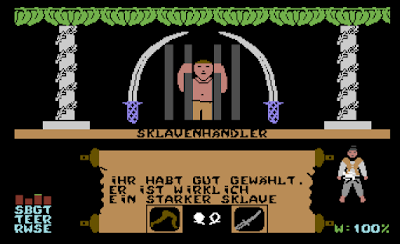 |
| You may think this is poor role-playing, but I'll give him a better life than he had behind those bars. |
- The same shops will go by different names from city to city. The healer is arzt in one city, alchimist in a second, and doktor in a third. Sometimes, there's no shop name at all, so you have to check every building and talk to every NPC.
- I spoke to a daimyo in one of the cities. I was hoping he'd give me a quest, but he just boasted about how much power he had, "second only to the shogun."
- I tried to visit that goddess's castle on the island in the starting continent, but the game wouldn't let me dock my boat alongside it. I think you have to have a grass square.
 |
| I knew I was making progress when I was able to translate this without help. "You can your ship here not leave." |
Entering the combat screen from the boat causes you to use the boat's cannons as the primary weapon. They're pretty devastating, but anything that can attack you at sea is equally tough and can damage both you and the boat. You can blast helpless enemies on shore, too, but you get only experience, not gold, from winning boat combats.
 |
| Naval combat. |
Touching any land while sailing the boat causes it to become damaged. It's hard to avoid this in narrow rivers.
One thing that I still haven't experienced is any sense of character development. I think maybe I'm supposed to burn incense at Buddha statues to "level up," but each city that has such a statue also has a puzzle associated with getting to it, and I've come up short. In Ukosa, the statue was at the end of a maze of pillars with invisible walls between some of them, and I could't find a way through. An NPC said something about walking through the "central pillar," but none of the pillars that seemed to be "central" (no matter how I looked at it) would allow me to do any such thing.
 |
| Getting nowhere. |
Meanwhile, in Ubamachi, a northern city ruled by Shujin, the Buddha is in the mountains. Supposedly, there's a secret path to get there, and an NPC directed me to a statue to ask about it. The statue told me to give it a "yari." I had no idea what this was, but I later found a weapon shop in a different town selling them for 3,450 gold. That'll have to wait.
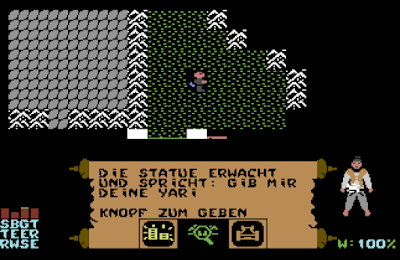 |
| Will I be able to get it back afterwards? |
Thus, well past the six-hour mark, I'm still a bit clueless. My only consolation is that it sounds like German players of the time were, too. I'll give it another 3 or 4 hours, at least, before deciding whether to continue. I'd lean towards a premature ending, but the next game, Ranadinn, is also an Ultima-inspired title with epic ambitions. Please moongate me out of this era.
At All Articles Nippon: The Inscrutable Orient
Thanks For Reading Nippon: The Inscrutable Orient this time, hopefully it can benefit you all. alright, see you in another article post.
You are now reading the articlel Nippon: The Inscrutable Orient with link address https://reviewgameupdate.blogspot.com/2018/03/nippon-inscrutable-orient.html

0 Response to "Nippon: The Inscrutable Orient"
Posting Komentar